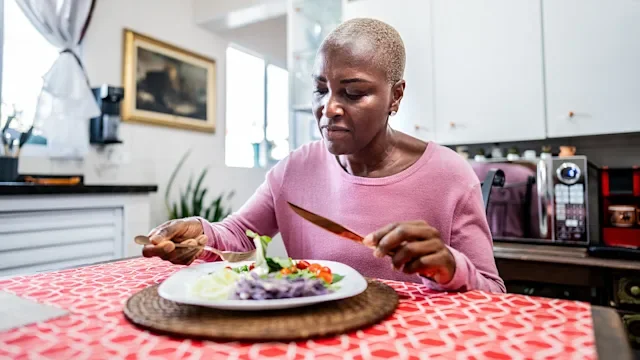Key takeaways:
Many people think that you can’t get pregnant on your period, but that’s a myth.
Individual menstrual cycles vary, so it’s possible to get pregnant when you’re on your period.
If you don’t want to get pregnant, don’t rely on timing methods. Use proper protection and/or birth control every time.
There are many myths and misconceptions about pregnancy. One of these myths is that you can’t get pregnant on your period. Getting pregnant on your period is not common, but it can happen. And the likelihood goes up a bit more for some — like older adults and those with irregular periods or short cycles.
Let's review the facts with Dr. Anne Hutchinson, MD, an OB/GYN and reproductive endocrinologist at Shady Grove Fertility.
Quiz: Am I pregnant?
How do you get pregnant?
Understanding the menstrual cycle is key for understanding pregnancy, according to Dr. Hutchinson. She explains the process and its different parts like this:
Your period: The menstrual cycle starts with the first day of your period. This is the day your brain realizes that you’re not pregnant from the last egg that was released. Essentially, it’s the beginning of a new reproductive cycle. This is considered day 1.
Ovulation: Over the next 2 weeks, your brain communicates with your ovary to prepare an egg for ovulation. “Your body is then programmed to enter a 2-week holding pattern to give that egg a chance to meet sperm, make an embryo, and have that embryo implant and start to grow in the uterus,” Dr. Hutchinson explains.
Fertilization: If sperm doesn’t fertilize the egg, your next period will come 14 days later, and the cycle starts all over again. But this can vary based on your specific cycle. If sperm does fertilize the egg, you’ll become pregnant.
The actual cycle is pretty predictable (if you don’t have underlying hormonal issues). But Dr. Hutchinson notes that there can be differences in individual timing — cycle length, ovulation day, and fertile window.
Can you get pregnant while on your period?
Yes, it’s possible to get pregnant while you’re on your period. But this isn’t likely. Pregnancy can happen during your period because the timing of your fertility window — the time of the month you’re most likely to get pregnant — can vary.
In one study, researchers explained that only 30% of women have a predictable fertility window. That means that the other 70%, even those with regular cycles, have an unpredictable fertility window. Because it’s unpredictable, that part of the fertility window can overlap with your period.
Can you get pregnant on your first period day?
You’re least likely to get pregnant on the first day of your period. Your fertility window usually falls between days 10 to 17 of the menstrual cycle — with day 1 being the first day of your period.
But not all bleeding is a period, Dr. Hutchinson explains. A “period” refers to when the uterine lining sheds 2 weeks after ovulation. But there are plenty of other times when you may experience vaginal bleeding or spotting.
“This can happen at any time during your cycle. And if you mistake this for a period, you might think that you can’t get pregnant even at times in your cycle when conception is most likely,” she says.
Read more like this
Explore these related articles, suggested for readers like you.
About 5% of people actually experience ovulation spotting. This is bleeding that occurs mid-cycle, when you’re ovulating. You may mistake this for the start of your period, but it’s actually a time when you’re most fertile.
Can you get pregnant on the last day of your period?
It’s possible to get pregnant on the last day of your period. This depends on the length of your period and the number of days between your period.
According to one review, the chance of being fertile on day 4 of your cycle (this is day 4 of your period) is around 2%. This likelihood increases until day 12, when it reaches 58%. Older people and those with regular cycles are more likely to conceive earlier in the cycle.
Can you get pregnant right before your period?
Ovulation typically occurs mid-cycle, or around days 14 to 16. This means it’s not likely to get pregnant right before your period. For pregnancy to occur, typically an egg must be fertilized within 24 hours of ovulation. This means that you’re less and less likely to get pregnant each day after ovulation until your period starts.
Most people can expect to get their period 2 weeks after ovulation occurs. But if you have irregular cycles, this gets more difficult to predict.
How can you get pregnant on your period?
Since the menstrual cycle can vary so much, it’s possible — though unlikely — to get pregnant while on your period. Let’s take a look at what increases the chances of getting pregnant during your period.
Irregular periods
Having irregular periods can mean that your fertility window is unpredictable. This may make it more likely for you to ovulate at a time that’s not mid-cycle and may overlap with your period.
Short menstrual cycles
Short menstrual cycles can make it easier for your period and fertility window to overlap. Most fertility window estimates are based on a 28-day cycle. If your cycle is much shorter than that, it’s possible for pregnancy to occur while on your period.
For example, if your cycle is only 22 days long, sperm that enters the cervix on the last day of your period may still be around when you ovulate. If that happens, there’s a chance that you could become pregnant.
Sperm lifespan
Sperm can live for 5 days in the body and cause pregnancy well after sex. If you have unprotected sex during your period and your fertile window falls shortly after, the sperm may still be able to result in pregnancy. This is more likely for people with shorter cycles.
Can you get pregnant during your period if you take birth control?
If you’re taking birth control as prescribed without missing any days, getting pregnant during your period is unlikely. With “perfect use,” when you take the pill every day (and at the same time with a mini pill), birth control pills are 99% effective at preventing pregnancy. This means that less than 1 person in 100 has an unplanned pregnancy. With typical use, birth control pills are 91% effective.
So should you use your period as a birth control method?
Tracking the timing of your period, or natural family planning, is not the most reliable form of birth control. As Dr. Hutchinson notes, “If you really don’t want to be pregnant, use protection every time.” Or talk with your healthcare provider about the type of birth control that best fits your lifestyle and needs.
The bottom line
While it’s not very likely, it’s possible to get pregnant while on your period. This may be more common if you have irregular periods or short cycles (less than 28 days). Most people have unpredictable fertility windows, so pregnancy can happen even when least expected. If you want to be sure to protect against pregnancy, it’s best to talk to your provider about your birth control options.

Why trust our experts?


References
Dasharathy, S. S., et al. (2012). Menstrual bleeding patterns among regularly menstruating women. American Journal of Epidemiology.
Reed, B. G., et al. (2018). The normal menstrual cycle and the control of ovulation. Endotext.
Sakkas, D., et al. (2015). Sperm selection in natural conception: What can we learn from Mother Nature to improve assisted reproduction outcomes? Human Reproduction Update.
Stirnemann, J. J., et al. (2013). Day-specific probabilities of conception in fertile cycles resulting in spontaneous pregnancies. Human Reproduction.
Wilcox, A. J., et al. (2000). The timing of the “fertile window” in the menstrual cycle: Day specific estimates from a prospective study. British Medical Journal.

















